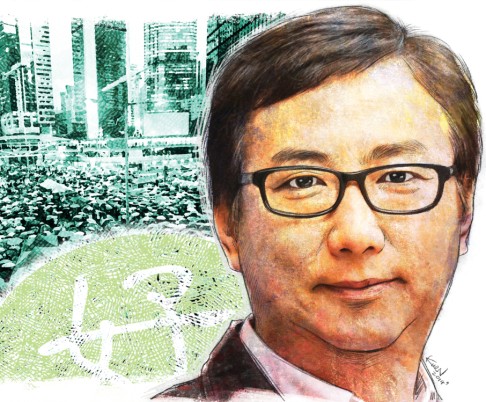Moderate pan-democrat Tik Chi-yuen and the tough path of the middle road
Undeterred by criticism of his moderate political stance, Tik Chi-yuen is now the sole pan-democratic voice in newest think tank


The think tank boasts 88 advisers, among them big names including mainland e-commerce giant Alibaba's Jack Ma Yun, former financial secretary Antony Leung Kam-chung and former Monetary Authority chief Joseph Yam Chi-kwong.
"Some say the foundation's just another VIP club; others say it's too pro-government. But I see it as a platform for people from different sectors and strata to exchange views," Tik says.
"If your points are good, you can try to persuade me to accept them. If I have better ideas, I'll try to convince you to consider them. You can view it as a talk shop, but that's how collective wisdom comes about - through frank discussion."
Tik does not mind being the only pan-democratic voice in the think tank.
"I'm the only voice, so I'll grab every opportunity to air my views," he says, adding that he hopes more of his fellow pan-democrats will play a part in the think tank's research.
The foundation will set up sub-groups to look into priority areas such as youth issues, Hong Kong-mainland relations and political reform, Tik says.
"There are many ways pan-democrats can play a role," he says. "There'll be some round-table meetings to which outside experts, scholars and other stakeholders will be invited. We can invite pan-democrats to share their views in these sessions."
The foundation was launched last Monday by Tung - now a vice-chairman of the Chinese People's Political Consultative Conference, China's top political advisory body - and will conduct studies on Hong Kong's long-term development.
Tung disclosed his plans to set up the think tank after his unexpected return to the media spotlight in September, when he called a press conference to voice his support for the National People's Congress Standing Committee's controversial ruling on Hong Kong's political reform.
Tik, who has worked in the youth and welfare sector for more than 30 years, believes he can contribute to the foundation's projects on the younger generation as well as politics.
"Young people nowadays don't read the newspapers, and they use the internet and mobile devices to exchange views. On these platforms, radical views often get more attention," he says.
"We adults like to read the papers and hold meetings for discussions. These are two totally different ways of communication. Adults need to learn to understand the young people. In about 10 years, they will lead the society. We need more studies to close the gap between the two generations."
Tik likens the Occupy Central pro-democracy movement to a generational war.
"Those aged over 50 want a more stable life and would think the young people are just stirring up trouble. But those under 30 can't see their future, so they can't wait to see radical changes."
He believes all issues can be resolved through negotiation, but is concerned about the politicisation of society that the movement has triggered.
"It's very sad to see middle-roaders' diminishing role [in this political impasse]. Moderates find themselves being criticised by both sides. The radicals say you're pro-government and those [more conservative] say you're trying to please the radicals," Tik says.
"Some aren't happy with the NPC Standing Committee's decision, but there are also other more moderate people who are just too frightened to speak out [for a compromise proposal] for fear of a backlash."
Most Hongkongers are pragmatic and still want "one person, one vote" in the 2017 chief executive election even if the electoral methods are imperfect, he says.
As a veteran moderate pan-democrat, Tik is no stranger to controversy and criticism.
To his critics, he's a "Leung fan" - a supporter of Chief Executive Leung Chun-ying, a synonym for being "pro-Beijing". "I don't mind being criticised. I think my wife and children have grown used to it," he says.
In 2012, Tik, as chief executive of the Institute of Family Education, expressed support for the controversial national education curriculum planned for schools. His stance drew flak from his party, which opposed the course.
Tik entered the social work field in 1978 after completing Form Six. In 1991, he won a seat in the Legislative Council. Three years later, he found himself embroiled in a controversy after declining to support a bill by lawmaker Emily Lau Wai-hing - now Democratic Party chief - that sought to return all Legislative Council seats by direct elections.
Lau's bill was defeated by one vote - 21 against and 20 for. Tik abstained. He was then a member of the political group Meeting Point, which merged with the United Democrats to form the Democratic Party later that year.
In a 2007 interview, Tik said a lawmaker's work was not suitable for him. Being a trained social worker, he preferred community service, and hence gave up seeking a second term in 1995.
But he tried to make a return in 2008, running for the social welfare functional constituency in the Legco elections. He was, however, defeated by the Social Workers' General Union's Peter Cheung Kwok-che.
Tik has been involved in various public service roles over the years, including welfare, education, health care and community development policy.
He has served as chairman of the Committee on Home-School Co-operation and sat on the Board of Education, the Committee on the Promotion of Civic Education, Commission for Poverty, and the Council for the Aids Trust Fund.
He is currently a member of the RTHK programme advisory panel, chief executive of the Institute of Family Education, and an executive committee member of the Council of Social Service.
Tik Chi-yuen
57
Master's degree in Public Policy And Management, City University
Doctor of Business Administration, Curtin University, Australia
Legislative Council member
Associate director, Oxfam
Director, Society for the Aged
Chief executive, Evangelical Lutheran Church Social Service

